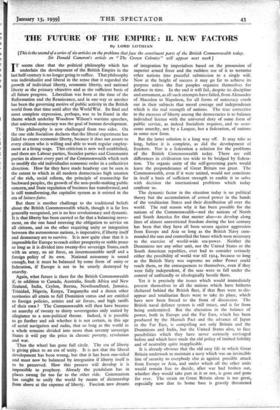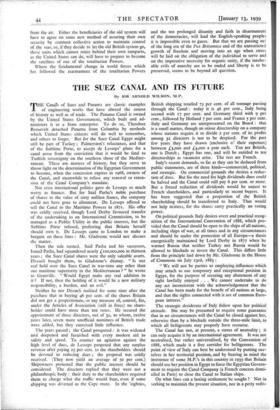THE FUTURE OF THE EMPIRE : II. NEW FACTORS
By LORD LOTHIAN [This is the second of a series of six articles on the problems that face the constituent parts of the British Commonwealth today. Sir. Donald Cameron's article on "The Crown Colonies" will appear next week ] TT seems clear that the political philosophy which has underlain the development of the British Empire in the last half-century is no longer going to suffice. That philosophy was individualist and liberal in the sense that it regarded the growth of individual liberty, economic liberty,- and national liberty as the primary objective and as the sufficient basis of all future progress. Liberalism was born at the time of the Reformation and the Renaissance, and in one way or another has been the governing motive of public activity in the British world from that time until after the World War. Its final and most complete expression, perhaps, was to be found in the theme which underlay Woodrow Wilson's wartime speeches, that universal democracy was the goal of human development.
This philosophy is now challenged from two sides. On the one side. Socialism declares that the liberal experiment has failed to create economic liberty, because it does not assure to every citizen who is willing and'able to work regular employ- ment at a living wage. This criticism is now well established, and there are Labour parties, Socialist parties and Communist parties in almost every part of the Commonwealth which seek to modify the old individualist economic order in a collectivist direction. How far they have made headway can be seen in the extent to which in all modern democracies -high taxation of the rich, social reform, the principle of trusteeship for backward peoples, the growth of the non-profit-making public concern, and State regulation of business has transformed, and is still transforming, the capitalist system as it existed in the era of laissez-faire.
But there is another challenge to the traditional beliefs about the British Commonwealth which, though it is far less generally recognised, yet is no less revolutionary and dynamic. It is that liberty has been carried so far that a balancing move- ment, on the one hand stressing the obligation to service on all citizens, and on the other requiring unity or integration between the autonomous nations, is imperative, if liberty itself and democracy are to survive. It is now quite clear that it is impossible for Europe to reach either prosperity or stable peace so long as it is divided into twenty-five sovereign States, each with an army, an air force, an insurmountable tariff and a foreign policy of its own. National autonomy is sound enough, but it must be balanced by some form of unity or federation, if Europe is not to be utterly destroyed by anarchy.
Again, what future is there for the British Commonwealth if, in addition to Canada, Australia, South Africa and New Zealand, India, Ceylon, Burma, Newfoundland, Jamaica, Trinidad, Nigeria, Kenya, Tanganyika and a dozen other territories all attain to full Dominion status and are entitled to foreign policies, armies and air forces, and 'high tariffs of their own ? The Commonwealth will then have become an anarchy of twenty to thirty sovereignties only united by allegiance to a non-political throne. Indeed, it is possible to go further and ask whether it is not certain, in this age of aerial navigation and radio, that so long as the world as a whole remains divided into more than seventy sovereign States it will pay the price in chronic poverty, revolution and war.
Thus the wheel has gone full circle. The era of liberty is giving place to an era of unity. It is not that the liberal development has been wrong, but that it has been one-sided and must now be balanced by integration if liberty itself is to be preserved. How this process will develop it is impossible to prophesy. Already the pendulum has in places swung far too far to the other side. Communism has sought to unify the world by means of dictatorship from above at the expense of liberty. Fascism now dreams of integration by imperialism based on the possession of superior armed force and the ruthless use of it to terrorise other nations into peaceful submission to a single will. Now at the height of success it may go far to achieve its purpose unless the free peoples organise themselves for defence in time. In the end it will fail, despite its discipline and armament, as all such attempts have failed, from Alexander of Macedon to Napoleon, for all forms of autocracy crush out in their subjects that moral courage and independence which is the real strength of nations. The true corrective to the excesses of liberty among the democracies is to balance individual licence with the universal duty of some form of public service, as indeed Socialism requires, and, to over- come anarchy, not by a League, but a federation, of nations in some new form.
But the latter solution is a long way off. It may take as long, before it is complete, as did the development of freedom. Nor is a federation a solution for the problems of the British Commonwealth today. There are still differences in civilisation too wide to be bridged by federa- tion. The organic unity of the self-governing parts would leave the preponderance of Great Britain too great. The Commonwealth, even if it were united, would not constitute in- itself a basis of sufficient strength to enable it to solve with decision the international problems which today confront us.
The dynamic factor in the situation today is no political theory but the accumulation of armed power in the hands of the totalitarian States and their distribution all over the world. The real reason why it has been possible for the nations of the Commonwealth—and the nations of North and South America for that matter also—to develop along lines of almost unrestricted freedom during the last century has been that they have all been secure against aggression from Europe and Asia so long as the British Navy com- manded the seas and controlled the bases which were necessary to the exercise of world-wide sea-power. Neither the Dominions nor any other unit, nor the United States or the South American republics, ever had to consider seriously either the possibility of world war till x9r4, because so long as the British Navy was supreme no other Power could reach them, or the consequences to themselves, even if they were fully independent, if the seas were to fall under the control of unfriendly or ideologically hostile fleets.
Yet it is precisely the issues which would immediately present themselves to all the nations which have hitherto sheltered behind the British fleet, if that fleet were to dis- appear and totalitarian fleets were to take its place, which have now been forced to the front of discussion. The British naval defence system is still intact, and is far from being undermined. But the alteration in the balance of power, both in Europe and the Far East, which has been produced by the Munich Pact and the advance of Japan in the Far East, is compelling not only Britain and the Dominions and India, but the United States also, to face possibilities which they have never seriously envisaged before and which have made the old policy of limited liability and of neutrality quite inapplicable.
It is already obvious that the old easy life in which Great Britain undertook to maintain a navy which was an invincible line of security to everybody else as against possible attack from Europe or Asia, and under which all the other units would remain free to decide, after war had broken out, whether they would take part in it or not, is gone and gone for ever. The strain on Great Britain alone is too great, especially now that its home base is gravely threatened from the air. Either the beneficiaries of the old system will have to agree on some new method of assuring their own security by common collective action to maintain control of the seas, or, if they decide to let the old British system go, those units which cannot retire behind their own ramparts, as the United States can do, will have to prepare to become the satellites of one of the totalitarian Powers.
Where the fundamental change in world forces which has followed the rearmament of the totalitarian Powers and the too prolonged disunity and faith in disarmament of the democracies, will lead the English-speaking peoples it is impossible even to guess. But that we are passing out of the long era of the Pax Britannica and of the unrestricted growth of freedom and moving into an age when stress will be laid on the obligation of the individual to serve and on the imperative necessity for organic unity, if the intoler- able evils of anarchy are to be ended and liberty is to be preserved, seems to be beyond all question.







































 Previous page
Previous page